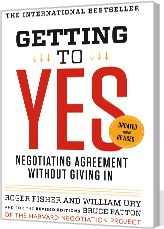Getting To Yes

Best advice on how to negotiate
I used to think that negotiation was about positioning, leveraging, and finally winning. This book by William Ury change my view completely. I no longer think of negotiation as a game. I see now it is about not getting into a fight in the first place. By resolving conflicts before they escalate, respecting mutual interests, and engaging others with compassion, you can achieve something far greater than victory: peace.
I love the wisdom in this best-selling book, which lays out a concise yet compassionate method for achieving desired outcomes in negotiations. The book’s principles align to an uncanny extent with my Chinese philosophy of being open to seeing the opposing view in life. It advocates principles such as “Listen with respect,” which is the same traditional concept in Chinese as “If you know yourself and know your opponent, you avoid war and both win.”
By using this understanding framework (the “Yes” in the title) I’ve been successful in business negotiations. If we get stuck –which happens frequently — I like to ask the other party “What are you most afraid of?” Once I understand their fears, I try to come up solutions that address them, and at the same time I am open to share my own fears. Turns out people want to be understood before they are open to understand you.
I also used this principle of “understanding and communication,” rather than “positioning, leveraging and winning” in my personal life, quickly coming to mutual agreement in situations like a divorce which are not usually quickly resolved. The outcome of this compassionate framework may not be optimal based on the standard expectations, but it is the optimal outcome based on the real context of the two parties.
In short, the concepts in this book really work.
11/29/12Excerpt
1. Separate the people from the problem
2. Focus on interests rather than positions
3. Generate a variety of options before settling on an agreement
4. Insist that the agreement be based on objective criteria.
*
Participants can avoid falling into a win-lose mentality by focusing on shared interests.
*
Power in a negotiation comes from the ability to walk away from negotiations.
*
Blaming is an easy mode to fall into, particularly when you feel that the other side is indeed responsible. But even if blaming is justified, it is usually counterproductive. Under attack, the other side will become defensive and will resist what you have to say. They will cease to listen, or they will strike back with an attack of their own. Assessing blame firmly entangles the people with the problem.
*
Your position is something you have decided upon. Your interests are what caused you to so decide.
*
We often try to influence others by threats and warnings of what will happen if they do not decide as we would like. Offers are usually more effective
*
The listeners should give the speaker their full attention, occasionally summarizing the speaker's points to confirm their understanding.
*
The more attention that is paid to positions, the less attention is devoted to meeting the underlying concerns of the parties.
*
The key to reconciling different interests is to look for items that are of low cost to you and high benefit to them, and vice versa.
*
The best way to respond to such tricky tactics is to explicitly raise the issue in negotiations, and to engage in principled negotiation to establish procedural ground rules for the negotiation.
*
Judgment hinders imagination.
*
Give them a stake in the outcome by making sure they participate in the process. If they are not involved in the process, they are unlikely to approve the product. It is that simple.
*
Look for opportunities to act inconsistently with their perceptions. Perhaps the best way to change someone’s perceptions is to send them a message different from what they expect.
Getting to Yes Roger Fisher 2012, 240 pp $10











